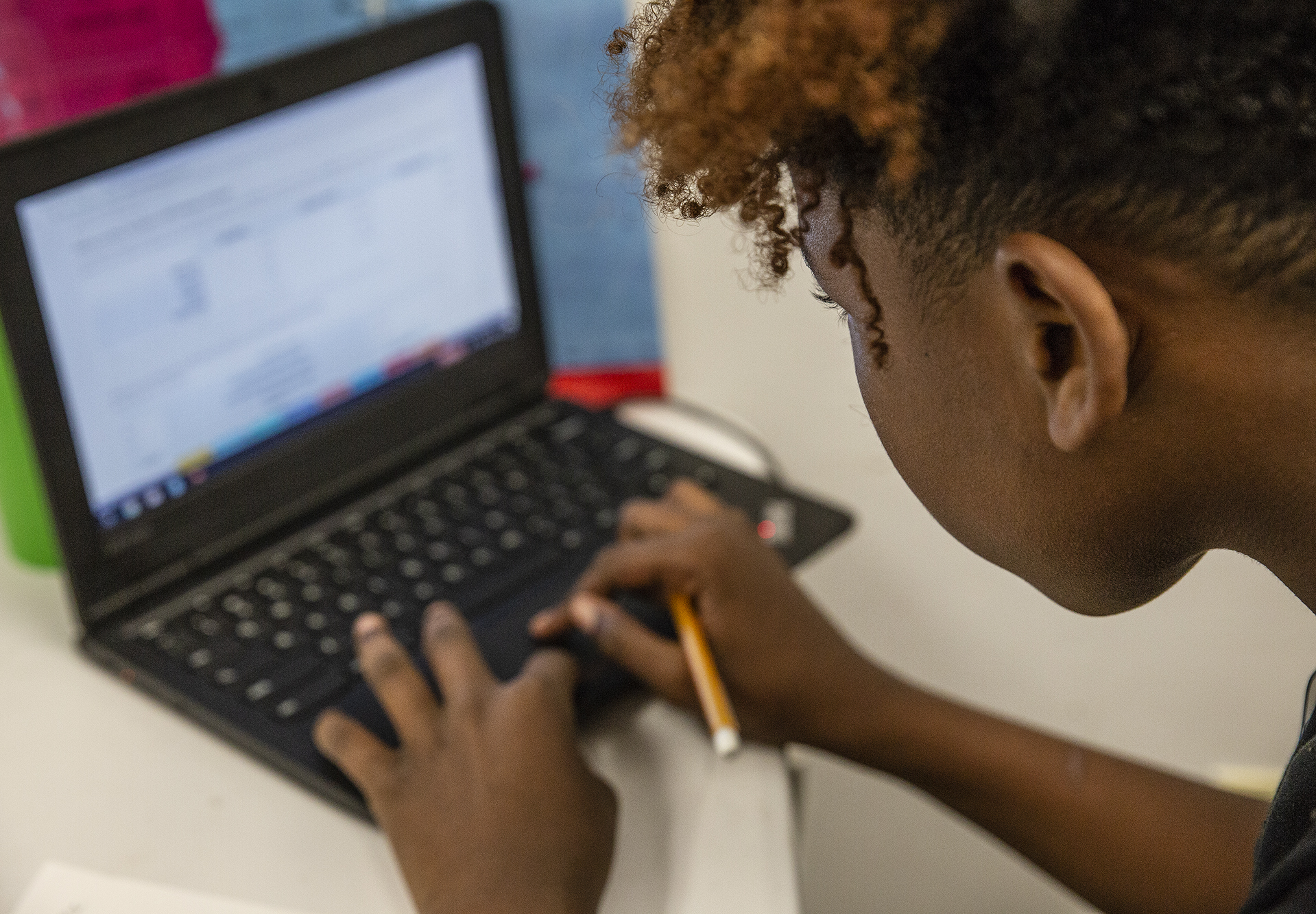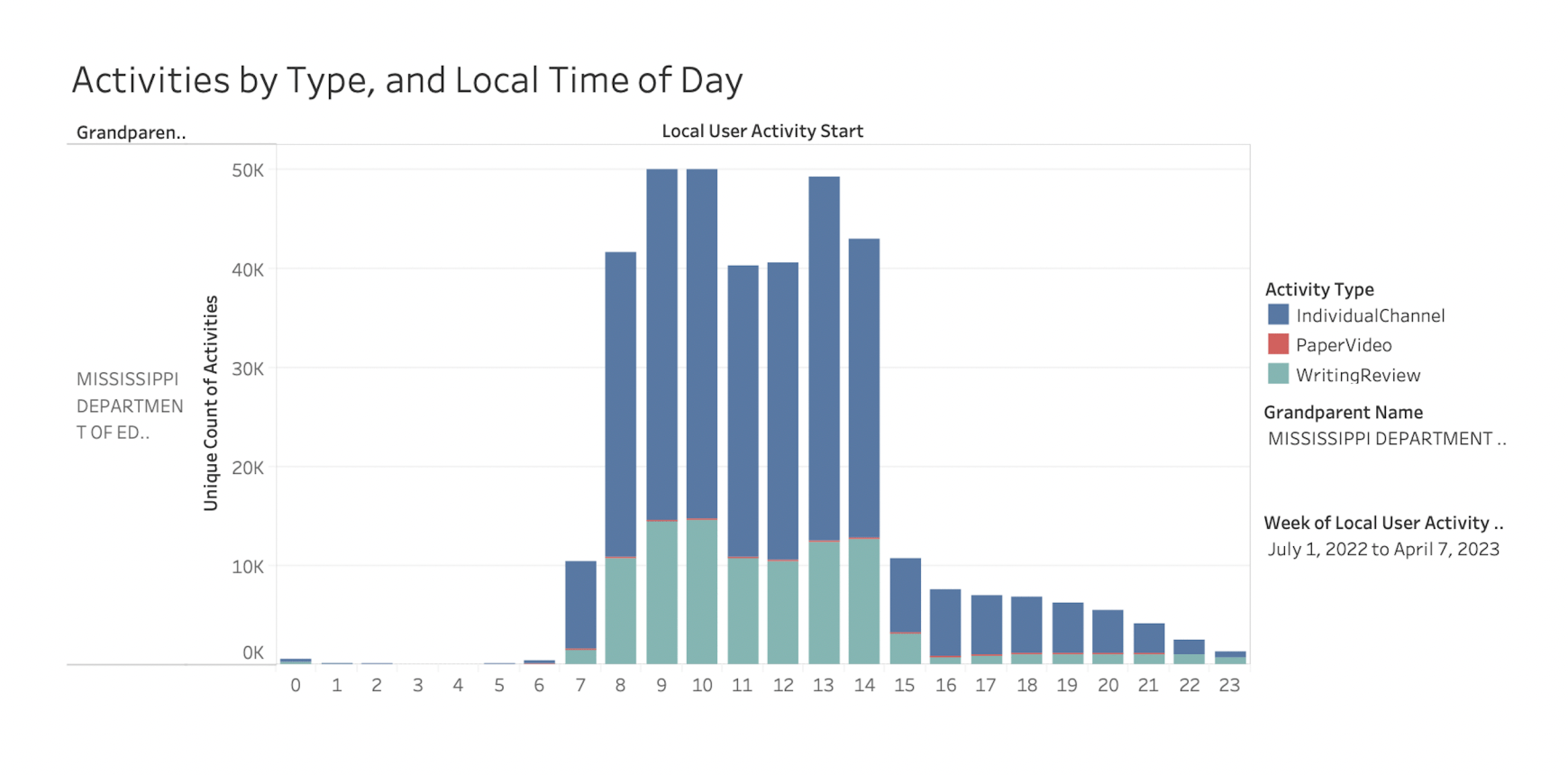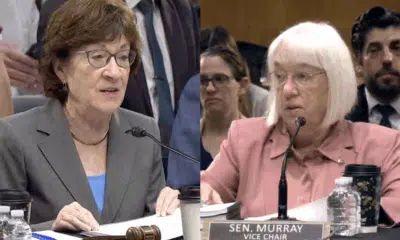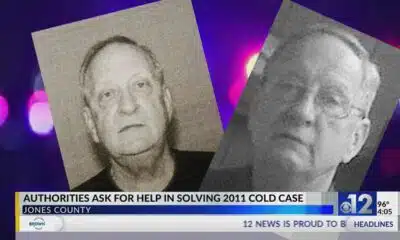Mississippi Today
MDE is spending millions on virtual tutoring service educators say is useful, though data shows it’s not widely used

One year into a nearly $11 million deal, educators say access to a 24/7 tutoring service is a positive addition to their school districts, though usage data shows just 35% of students with access have used it at least once this school year.
The Mississippi Department of Education signed a $10.7 million contract with Paper, a virtual tutoring company, in March of 2022. The tutorial services are one effort to address learning loss caused by the pandemic and are funded by federal pandemic relief dollars. Paper has numerous contracts across the country, some of which have already ended because of poor student participation. Columbus City Schools in Ohio had a usage rate of 8% when the district cut ties, as reported by Chalkbeat.
READ MORE: How three Mississippi school districts are spending $207 million in federal relief funds
The contract required a minimum of 300 tutoring sessions a month, distributed evenly across the state’s six regional education communities. When asked if this goal was rigorous enough given the 320,000 Mississippi students grades 3-12 with access to Paper, Associate State Superintendent Marla Davis said it’s important to keep in mind that the state cannot mandate students use the service and that even if it was a low goal, it’s one that Paper has far exceeded. Students have used Paper over 2 million times this school year, with 285,000 of those uses being live one-on-one help sessions.
Paper provides 24/7 access to live tutoring through an instant messaging platform, but recently added a new feature that allows students to send voice recordings if they are not strong typists. Students are randomly matched with a tutor based on the subject they request, and can also upload essays for writing review or practice for the math state tests. The test prep, which does not involve a live tutor unless a student asks for help, accounts for 80% of the 2 million log-ons.
While more than a third of students with access have used the service at least once since the start of the school year, 18% are regular users.
Nicholas Munyan-Penny, assistant director of P-12 policy at national education civil rights group The Education Trust, said some states or districts have made their on-demand tutoring contracts results-based, requiring students to improve a certain amount for the contract to get paid. He said this seems like a better model to hold vendors accountable for providing high quality services, which some districts say has brought improved vendor engagement.
To date, Mississippi’s education department has paid Paper $4.5 million through flat-rate invoices.
The contract was originally presented as a ”high-dosage tutoring” option, a research-supported method of tutoring that involves a structured curriculum aligned with classroom work being taught during the school day in small groups with the same tutor each time, ideally three to four times a week.
Davis, the associate state superintendent, said while the state still encourages districts to use Paper frequently, the department has changed its language, calling the service “on-demand tutoring” to better reflect what Paper offers.
Paper participation varies significantly across the state, largely because districts get to choose how to implement the services. Some have incorporated it into structured class time or remediation activities, while others just encourage students to use it independently.
Districts with lower usage rates had a variety of reasons for why they were not utilizing the platform more, including students doing well enough that they didn’t need additional tutoring and having a local contract with a different virtual tutoring service to finish out first.
The Natchez-Adams School District has pursued in-person tutoring more closely resembling the high-dosage model, saying in an email that it’s what students and parents preferred, but that it hopes to push Paper more next year as well.
“When we see that usage is waning, we do get on the phone,” Davis said at the April 19 meeting of the state Board of Education. “We did quite a number of phone calls to districts and say ‘Hey, you all opted in to these tutorial services, they are free, is there anything we do to support you in the implementation?’”
Teresa Jackson, superintendent of the Winona-Montgomery school district, said the district decided to delay implementing Paper for a year because it received a grant from the education department to update textbooks and other curriculum materials.
“For us, it was just another thing to have to learn,” she said. “We actually think it is a very good program, it’s just that we were kinda saturated with curriculum products this year and we want our teachers to be very well trained in something before we ask them to use it.”
Jackson said training sessions are already scheduled to familiarize teachers with the service before summer school and the 2023-24 school year.
Other districts with high usage rates have cited the training provided by the local Paper representatives as instrumental to the adoption of the program. Davis said the regional representatives are all former Mississippi educators, an aspect she believes is unique to Mississippi’s services.
In the Quitman School District, where 87% of students have used Paper at least once, Curriculum Coordinator Shevonda Truman said the district asked its local representative to come work with teachers who were not utilizing it as often.
“When you have that kind of exposure, when you have that opportunity to really have someone show you the tools and how to use them in your classroom, individualizing it just for you and just for your kiddos, it makes a big difference,” she said.
Truman also said the majority of Paper usage in the district occurs during the school day, something other districts and state-level data have echoed.

Munyan-Penny of The Education Trust said that on-demand tutoring services often do not have the characteristics that make high-dosage or intensive tutoring effective. Despite this, he was pleasantly surprised to hear that the majority of Paper usage in Mississippi is happening during the school day, as it helps ensure that students who need help are getting access to it.
Holmes County Superintendent Jennifer Wilson said shifting to incorporating Paper into the school day has improved participation in a rural district where many students struggle with home internet access. In December, only 3% of students had used the service at least once, a number that rose to 28% in April once they started using the math state test prep feature during the school day.
“We’re going to be looking at how else we can move the needle in terms of our usage of Paper so that we get the biggest return on the investment,” Wilson said.
Some teachers have said they feel like the investment is worth it and hope to see it continue.
“I’ve been a teacher for 12 years now, and this is the first time that they’ve pushed out something new like this that I was actually excited about and felt like was worth the money,” said Shundra Young, a biology teacher at Germantown High School in the Madison County School District.
Young said she uses Paper to help students review content they missed on benchmark tests, giving them a list of questions they’re required to go over with the Paper tutors. Students then upload screenshots of the conversation and take a mini-quiz afterward to make sure they understand what they went over with the tutor.
“From the beginning to the end of the conversation with the tutor, I’ve even seen more of an effort or students going from one or two-word answers to actually typing out things,” she said. “Sometimes they even start asking questions that weren’t on the list for them to ask, so I feel like, one, it’s really building confidence because it’s helping them realize they can get it, and the other thing is I have seen an increase in comprehension for the ones that have used it.”
Davis, the associate state superintendent, said she sees it as “premature” to comment on whether Paper is improving outcomes statewide since state test results aren’t available yet.
Results may not be in, but recent efforts to increase use of the platform have shown results. A “March Madness” contest accounted for 1.6 million Paper log-ons out of the overall 2 million this year. The contest specifically tracked activity in math games developed using Mississippi content standards to help students prepare for the state tests. If a student has trouble with a question in the math games, they can request a tutor to join them.
The success of the math prep questions has led Taylor McCain, an English Language Arts teacher at Jefferson Middle School in the Columbia School District, to request them for her subject area as well. This addition is one of the only things McCain said she would like to see changed though, as she has “thoroughly enjoyed” using the essay check feature in her classes to help with peer reviews of essays.
“(Paper) saves me so much time in grading essays,” she said. “Now the peer review of the rough draft is finished and they’re just going in for final edits, and I get to grade the whole finished essay instead of the rough draft and the peer review and then grading the whole essay.”
McCain said she likes how Paper’s system requires students to explain the prompt and what the tutor should be checking for. She added that the feedback from the tutors is always constructive criticism and does not merely fix things for students.
Other educators echoed this sentiment and said sometimes students express frustration that they don’t get the answers more quickly, but that it’s one thing teachers really appreciate about the platform.
“Tutors do not give them the answer, they talk them through it and talk them through how to get to it … asking them leading questions like a teacher would,” said Katherine Pitts, a math instructional coach in the Biloxi School District.
Pitts also said she has heard from some math teachers that high-achieving students have an easier time using the platform.
“Your higher achieving students know what questions to ask and so they know ‘this is what I need help in and this is what I don’t understand,’” she said. “Whereas some of our regular students, it’s kind of one of those things of ‘I don’t understand what I don’t understand,’ so it sometimes is difficult for them.”
Pitts said they’re planning to “use it as much as we can as long as we have it.” The state’s contract with Paper is slated to end in September 2024.
Pitts added the Biloxi School District wants the state to see that it’s being used and students are taking advantage of this resource.
Multiple districts expressed their desire for the state to make the service available after the expiration of the federal pandemic relief money. Davis said the education department has not discussed extending the contract yet, but she hopes to be able to since the department has received such positive feedback.
Munyan-Penny of The Education Trust said it should come down to whether or not there’s growth in student performance, particularly among students who are the most at need.
“If Mississippi does some evaluation work on how the Paper tutoring is going and they find that it’s actually making an impact, then that seems like maybe it’s something they do want to continue,” he said. “But I think it’s important to make sure that anecdotal positive feelings and experiences with the platform translate into actual gains.”
This article first appeared on Mississippi Today and is republished here under a Creative Commons license.
Did you miss our previous article...
https://www.biloxinewsevents.com/?p=237526
Mississippi Today
Brain drain: Mother understands her daughters’ decisions to leave Mississippi
Editor’s note: This Mississippi Today Ideas essay is published as part of our Brain Drain project, which seeks answers to Mississippi’s brain drain problem. To read more about the project, click here.
Back when I was a kid in 1988, my mama and I had an argument about what I wanted to major in at college.
I had dreamed of being a journalist since the age of 8. To me, that meant that I was going to Ole Miss, which had the journalism department.
My mama said I could only go away from home to Ole Miss if I was going to major in law.
So I settled on going to Mississippi State University just down the road and majoring in communication. She told me I should major in engineering since that’s what State was known for.
I said, “That’s even dumber than me going to law school. I hate math.”
“Well, you could at least try,” she said.
I said no. Then she told me I was wasting my education and turned her back on me.
I get it. She knew and I knew that I couldn’t stay in Choctaw County where I was raised and earn a living with that degree. I would have to go somewhere else — probably to the Jackson metro area and work for Gannett or the Associated Press. Or to Memphis. Or Biloxi. Or even New Orleans. She never really forgave me for moving to the Jackson metro, working in my field and raising her grandchildren so far from her.
After a while, I got used to the pace of life around here. I knew I probably wouldn’t ever move anywhere else because I noticed that people who left Mississippi often came back, whether due to family obligations or a realization that “somewhere else” wasn’t quite all it was cracked up to be.
I also noticed that a lot of people played up how they were from Mississippi while making a very good living being someplace else. I decided I wanted to prove you could be from Mississippi, live in Mississippi, work in Mississippi and make something of yourself without leaving Mississippi.
But I noticed something else over the years, too. Most of the kids in Brandon dreamed of going off from home to cities like Atlanta, Nashville, Dallas, DC, New York or Orlando. They didn’t seem to have reasons — just a desire to get away from the state as fast as they could.
Then my three daughters and I started having conversations about what they wanted to major in when they went to college. My oldest wanted to be a chef. My middle one was undecided between chemical engineering and landscape architecture. And my youngest was fascinated with roads and bridges.
I was all too aware of what had happened in the job markets in Mississippi since I had come up. Companies closed operations in a globalized economy and fled to cheaper labor markets. The advent of the internet meant employers could hire from all over the world. Longtime business leaders retired and sold out to big corporations that reduced investments in local communities that had supported those businesses for decades and then complained that those towns didn’t offer enough amenities for their employees to want to relocate there.
But the reality really set in when my chef daughter chose her first internship — in historic Williamsburg, Virginia.
I would never have dreamed of driving that far from home to try out a place to work when I was her age. Then after her senior year, she interned at Walt Disney World and got hired full-time before the internship was over. She was off to live in Orlando where now with her husband and young son she’s creating community and loves going to work every day with a pretty enviable benefits package, too, a thing unheard of in the culinary world in Mississippi.
My middle one finally settled on chemical engineering and was picked for a co-op job in her first semester at age 18 at a company in Georgia. When she graduated four years later, we packed her off to Indiana for a research and development job, and she now lives in New Hampshire with her husband, making six figures a year at 26 years old and looking forward to partaking in the cultural offerings in New York City when she can.
The youngest is currently in college for civil engineering, and I’m bracing myself for the inevitable. She doesn’t want to work for state government, so she’s likely going out of state as well. Her comment about coming back to Jackson metro was the most damning of all. “There’s nothing to do here,” she says.
A lot of people ask me questions: How often do you see your daughters? How can you stand being so far from your grandson? Don’t they at least come home for Christmas?
The answer to all of those questions is that we do the best we can. We text, we message on Facebook, we talk on the phone at least once a week, every Sunday. We arrange visits; sometimes it’s us driving to them while other times they drive to us.
I can’t imagine making my children as miserable as my mom made me over my life choices. We are flexible, understanding, and very, very proud of our daughters, who are grappling with enough in their lives without us loading them down with guilt over when they are coming home.
The calculus may change in the future. We may have declines in health and need to move closer to one of our children if we need assistance. Or we may need to be in assisted living care here in Mississippi where such care may be marginally cheaper than wherever our girls land.
But I don’t wish our girls had settled for life in Mississippi.
What I wish is that Mississippi could find a way to live up to its potential — to be a place more worthy of my daughters’ loyalty, affections and investment in themselves.
Maybe it will be someday. I hope so, for all of our sakes.
Julie Liddell Whitehead lives and writes from Mississippi. An award-winning freelance writer, Julie covered disasters from 9/11 to Hurricane Katrina throughout her career. Her first book is “Hurricane Baby: Stories,” published by Madville Publishing. She writes on mental health, mental health education and mental health advocacy. She has a bachelor’s degree in communication, with a journalism emphasis, and a master’s degree in English, both from Mississippi State University. In 2021, she completed her MFA from Mississippi University for Women.
This article first appeared on Mississippi Today and is republished here under a Creative Commons Attribution-NoDerivatives 4.0 International License.
The post Brain drain: Mother understands her daughters' decisions to leave Mississippi appeared first on mississippitoday.org
Note: The following A.I. based commentary is not part of the original article, reproduced above, but is offered in the hopes that it will promote greater media literacy and critical thinking, by making any potential bias more visible to the reader –Staff Editor.
Political Bias Rating: Center-Left
This essay reflects a Center-Left perspective by focusing on social and economic challenges faced by Mississippi, such as brain drain, job market changes, and community decline. The tone is empathetic and advocates for investment in local opportunities and amenities to retain talent, aligning with progressive concerns about economic inequality and regional development. However, it remains largely personal and reflective rather than explicitly ideological or partisan. The article critiques systemic economic shifts without advancing a polarized political agenda, emphasizing hope for future improvement and a more supportive environment for young professionals.
Mississippi Today
After 30 years in prison, Mississippi woman dies from cancer she says was preventable
Behind Bars, Beyond Care:
A Mississippi Today investigation into suffering, secrecy and the business of prison health care
Susie Balfour, diagnosed with terminal breast cancer two weeks before her release from prison, has died from the disease she alleged past and present prison health care providers failed to catch until it was too late.
The 64-year-old left the Central Mississippi Correctional Facility in December 2021 after more than 30 years of incarceration. She died on Friday, a representative for her family confirmed.
Balfour is survived by family members and friends. News of her passing has led to an outpouring of condolences of support shared online from community members, including some she met in prison.
Instead of getting the chance to rebuild her life, Balfour was released with a death sentence, said Pauline Rogers, executive director of the RECH Foundation.
“Susie didn’t just survive prison, she came out fighting,” Rogers said in a statement. “She spent her final years demanding justice, not just for herself, but for the women still inside. She knew her time was limited, but her courage was limitless.”
Last year, Balfour filed a federal lawsuit against three private medical contractors for the prison system, alleging medical neglect. The lawsuit highlighted how she and other incarcerated women came into contact with raw industrial chemicals during cleaning duty. Some of the chemicals have been linked to an increased risk of cancer in some studies.
The companies contracted to provide health care to prisoners at the facility over the course of Balfour’s sentence — Wexford Health Sources, Centurion Health and VitalCore, the current medical provider — delayed or failed to schedule follow-up cancer screenings for Balfour even though they had been recommended by prison physicians, the lawsuit says.
“I just want everybody to be held accountable,” Balfour said of her lawsuit. “ … and I just want justice for myself and other ladies and men in there who are dealing with the same situation I am dealing with.”
Rep. Becky Currie, who chairs the House Corrections Committee, spoke to Balfour last week, just days before her death. Until the very end, Balfour was focused on ensuring her story would outlive her, that it would drive reforms protecting others from suffering the same fate, Currie said.
“She wanted to talk to me on her deathbed. She could hardly speak, but she wanted to make sure nobody goes through what she went through,” Currie said. “I told her she would be in a better place soon, and I told her I would do my best to make sure nobody else goes through this.”
During Mississippi’s 2025 legislative session, Balfour’s story inspired Rep. Justis Gibbs, a Democrat from Jackson, to introduce legislation requiring state prisons to provide inmates on work assignments with protective gear.
Gibbs said over 10 other Mississippi inmates have come down with cancer or become seriously ill after they were exposed to chemicals while on work assignments. In a statement on Monday, Gibbs said the bill was a critical step toward showing that Mississippi does not tolerate human rights abuses.
“It is sad to hear of multiple incarcerated individuals passing away this summer due to continued exposure of harsh chemicals,” Gibbs said. “We worked very hard last session to get this bill past the finish line. I am appreciative of Speaker Jason White and the House Corrections Committee for understanding how vital this bill is and passing it out of committee. Every one of my house colleagues voted yes. We cannot allow politics between chambers on unrelated matters to stop the passage of good common-sense legislation.”
The bill passed the House in a bipartisan vote before dying in the Senate. Currie told Mississippi Today on Monday that she plans on marshalling the bill through the House again next session.
Currie, a Republican from Brookhaven, said Balfour’s case shows that prison medical contractors don’t have strong enough incentives to offer preventive care or treat illnesses like cancer.
In response to an ongoing Mississippi Today investigation into prison health care and in comments on the House floor, Currie has said prisoners are sometimes denied life saving treatments. A high-ranking former corrections official also came forward and told the news outlet that Mississippi’s prison system is rife with medical neglect and mismanagement.
Mississippi Today also obtained text messages between current and former corrections department officials showing that the same year the state agreed to pay VitalCore $100 million in taxpayer funds to provide healthcare to people incarcerated in Mississippi prisons, a top official at the Department remarked that the company “sucks.”
Balfour was first convicted of murdering a police officer during a robbery in north Mississippi, and she was sentenced to death. The Mississippi Supreme Court reversed the conviction in 1992, finding that her constitutional rights were violated in trial. She reached a plea agreement for a lesser charge, her attorney said.
As of Monday, the lawsuit remains active, according to court records. Late last year Balfour’s attorneys asked for her to be able to give a deposition with the intent of preserving her testimony. She was scheduled to give one in Southaven in March.
Rogers said Balfour’s death is a tragic reminder of systemic failures in the prison system where routine medical care is denied, their labor is exploited and too many who are released die from conditions that went untreated while they were in state custody.
Her legacy is one RECH Foundation will honor by continuing to fight for justice, dignity and systemic reform, said Rogers, who was formerly incarcerated herself.
This article first appeared on Mississippi Today and is republished here under a Creative Commons Attribution-NoDerivatives 4.0 International License.
The post After 30 years in prison, Mississippi woman dies from cancer she says was preventable appeared first on mississippitoday.org
Note: The following A.I. based commentary is not part of the original article, reproduced above, but is offered in the hopes that it will promote greater media literacy and critical thinking, by making any potential bias more visible to the reader –Staff Editor.
Political Bias Rating: Center-Left
This article presents a critical view of the Mississippi prison health care system, highlighting systemic failures and medical neglect that led to the death of a formerly incarcerated woman. The tone and framing focus on social justice issues, prisoner rights, and the need for government accountability and reform, which align with Center-Left values emphasizing government responsibility for vulnerable populations. While the article is largely investigative and fact-based, its emphasis on advocacy for reform, criticism of privatized prison health contractors, and highlighting bipartisan legislative efforts suggest a Center-Left leaning perspective rather than neutral reporting.
Mississippi Today
FBI concocted a bribery scheme that wasn’t, ex-interim Hinds sheriff says in appeal
Former interim Hinds County sheriff Marshand Crisler is appealing bribery and ammunition charges stemming from his 2021 campaign, arguing that the federal government played on his relationship with a former supporter to entrap him.
Crisler had asked Tonarri Moore, who donated to past campaigns, for a financial contribution for the sheriff’s race. Moore said he would donate if Crisler helped with several requests. Without the previous relationship, Crisler would not have acted, his attorney argues, and Crisler had no reason to believe he was being bribed.
“The government, having concocted a bribery scheme to entrap Crisler, then had to contrive a corresponding quid pro quo to support the scenario with which to entrap him,” attorney John Holliman wrote in a Saturday appellant brief.
Crisler is asking the U.S. 5th Circuit Court of Appeals to reverse his conviction and render its own rulings on both counts.
He was convicted in federal court in November after a three-day trial and sentenced earlier this year to 2 ½ years in prison. Crisler is serving time in FCI Beckley in West Virginia.
The day before Crisler reached out to Moore to ask for support for his campaign for sheriff, Drug and Enforcement Administration agents raided Moore’s home and found guns and drugs. An FBI agent called to the scene looked through Moore’s phone and saw Crisler had called.
According to the appellant brief, the agent asked Moore what Crisler would do if offered money, and if Moore was bribing him. Moore said he wasn’t bribing Crisler, and the agent asked if Moore would do it.
At that time, there weren’t reasonable grounds to start a bribery investigation into Crisler, his attorney argues, nor was there reason to believe he was seeking a bribe.
Moore agreed to become an informant for the FBI, in exchange for the government not prosecuting him for the guns and drugs.
The FBI fitted him with a wire to record Crisler during meetings, which began that day. The meetings included one inside Moore’s night club and a cigarette lounge in Jackson. Agents provided Moore with the $9,500 he gave to Crisler between September and November 2021.
Crisler’s 2023 indictment came as he campaigned again for sheriff and months before the primary election. He remained in the race and lost to the incumbent who he faced in 2021.
At trial, the government argued the exchange of money were attempts to bribe because Moore made several requests of Crisler: to move his cousin to a different part of the Hinds County Detention Center, to get him a job in the sheriff’s office and for Crisler to let Moore know if law enforcement was looking into his activities.
In closing arguments, Assistant U.S. Attorney Charles Kirkham pointed to examples of quid pro quo in recordings, including one where Moore said to Crisler, “You scratch my back, I scratch yours” and Crisler replied “Hello!” in a tone that the government saw as agreement.
The appellant’s brief argues that without Moore’s requests, the government lacked a way to show quid pro quo, a requirement of bribery charge: that Crisler committed or agreed to commit an official act in exchange for funds.
Moore also asked Crisler to give him bullets despite being a convicted felon, which is prohibited under federal law. The brief notes how the government directed Moore to come up with a story for needing the bullets and to ask Crisler to give them to him.
In response, Crisler told Moore he could buy bullets at several sporting goods stores. Moore said they ran out, and eventually Crisler gave him bullets.
Crisler also argues that the government prosecuted routine political behavior. Specifically, accepting campaign donations is not illegal, and can not constitute bribery unless there is an explicit promise to perform or not perform an official act in exchange for money.
“Our political system relies on interactions between citizens and politicians with requests being made for this or that which is within the power of the elected official to do,” the brief states. “This does not constitute a bribery scheme. It is the normal working of our political system.”
This article first appeared on Mississippi Today and is republished here under a Creative Commons Attribution-NoDerivatives 4.0 International License.
The post FBI concocted a bribery scheme that wasn’t, ex-interim Hinds sheriff says in appeal appeared first on mississippitoday.org
Note: The following A.I. based commentary is not part of the original article, reproduced above, but is offered in the hopes that it will promote greater media literacy and critical thinking, by making any potential bias more visible to the reader –Staff Editor.
Political Bias Rating: Center-Right
The article presents the legal appeal of former interim Hinds County sheriff Marshand Crisler with a focus on his argument that the FBI orchestrated an entrapment scheme. The language is largely factual and centers on the defense’s claims and legal standards for bribery, emphasizing normal political behavior versus illegal conduct. While the article reports on the government’s position, it gives significant space to Crisler’s defense and critiques of federal prosecution tactics. This framing, highlighting skepticism toward federal law enforcement and emphasizing the defense perspective, suggests a slight center-right leaning, reflecting a cautious stance on government overreach without overt ideological language.
-
News from the South - Texas News Feed6 days ago
Rural Texas uses THC for health and economy
-
Mississippi Today3 days ago
After 30 years in prison, Mississippi woman dies from cancer she says was preventable
-
News from the South - Alabama News Feed7 days ago
Decision to unfreeze migrant education money comes too late for some kids
-
News from the South - Georgia News Feed4 days ago
Woman charged after boy in state’s custody dies in hot car
-
Mississippi Today7 days ago
They own the house. Why won’t they cut the grass?
-
News from the South - Arkansas News Feed7 days ago
Trump’s big proposed cuts to health and education spending rebuffed by US Senate panel
-
News from the South - Georgia News Feed6 days ago
Delta jet makes emergency landing | FOX 5 News
-
Mississippi News Video7 days ago
Jones County investigators work to solve 2011 cold case

















































